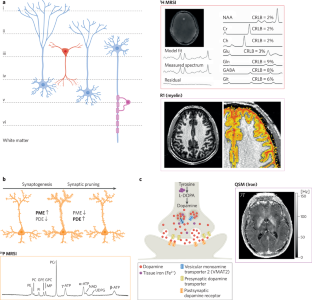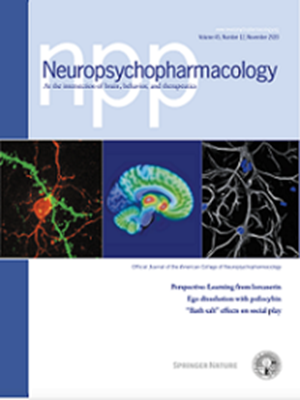利用超高磁场(7T)磁共振成像技术开展精神病学研究
IF 6.6
1区 医学
Q1 NEUROSCIENCES
引用次数: 0
摘要
非侵入性脑部成像在我们了解导致精神疾病出现的神经特性方面发挥了至关重要的作用。然而,要描述精神病症状的核心神经生物学机制,需要比标准场强磁共振成像采集(如 3T 磁共振成像)更高的结构、功能和神经化学特异性。7 特斯拉(7T)超高磁场(UHF)成像技术为确定神经生物学系统提供了机会,这些系统会带来风险、确定病因、描述疾病进展和重大精神疾病的治疗结果。扫描仪可用性、监管审批和序列可用性的提高使得超高频在临床群组中的应用比以往任何时候都更加可行,但超高频方法在心理健康研究中的应用仍然刚刚起步。在这篇技术综述中,我们将介绍受益于超高频采集的核心神经成像方法,包括高分辨率结构和功能成像、单核(1H)和多核(如 31P)磁共振光谱以及用于评估脑组织铁和髓鞘的定量磁共振技术。我们将讨论 7T 磁共振成像的优势,包括更高的信号和对比度与噪声比、更强的空间分辨率、更高的测试重复可靠性、分子和神经化学特异性,以及这些优势如何开始揭示精神疾病的机制。最后,我们考虑了超高频目前在临床群组应用中的局限性,并指出目前正在进行的工作旨在通过持续开发超高频硬件、软件和协议来克服技术障碍。本文章由计算机程序翻译,如有差异,请以英文原文为准。


Leveraging ultra-high field (7T) MRI in psychiatric research
Non-invasive brain imaging has played a critical role in establishing our understanding of the neural properties that contribute to the emergence of psychiatric disorders. However, characterizing core neurobiological mechanisms of psychiatric symptomatology requires greater structural, functional, and neurochemical specificity than is typically obtainable with standard field strength MRI acquisitions (e.g., 3T). Ultra-high field (UHF) imaging at 7 Tesla (7T) provides the opportunity to identify neurobiological systems that confer risk, determine etiology, and characterize disease progression and treatment outcomes of major mental illnesses. Increases in scanner availability, regulatory approval, and sequence availability have made the application of UHF to clinical cohorts more feasible than ever before, yet the application of UHF approaches to the study of mental health remains nascent. In this technical review, we describe core neuroimaging methodologies which benefit from UHF acquisition, including high resolution structural and functional imaging, single (1H) and multi-nuclear (e.g., 31P) MR spectroscopy, and quantitative MR techniques for assessing brain tissue iron and myelin. We discuss advantages provided by 7T MRI, including higher signal- and contrast-to-noise ratio, enhanced spatial resolution, increased test-retest reliability, and molecular and neurochemical specificity, and how these have begun to uncover mechanisms of psychiatric disorders. Finally, we consider current limitations of UHF in its application to clinical cohorts, and point to ongoing work that aims to overcome technical hurdles through the continued development of UHF hardware, software, and protocols.
求助全文
通过发布文献求助,成功后即可免费获取论文全文。
去求助
来源期刊

Neuropsychopharmacology
医学-精神病学
CiteScore
15.00
自引率
2.60%
发文量
240
审稿时长
2 months
期刊介绍:
Neuropsychopharmacology is a reputable international scientific journal that serves as the official publication of the American College of Neuropsychopharmacology (ACNP). The journal's primary focus is on research that enhances our knowledge of the brain and behavior, with a particular emphasis on the molecular, cellular, physiological, and psychological aspects of substances that affect the central nervous system (CNS). It also aims to identify new molecular targets for the development of future drugs.
The journal prioritizes original research reports, but it also welcomes mini-reviews and perspectives, which are often solicited by the editorial office. These types of articles provide valuable insights and syntheses of current research trends and future directions in the field of neuroscience and pharmacology.
 求助内容:
求助内容: 应助结果提醒方式:
应助结果提醒方式:


